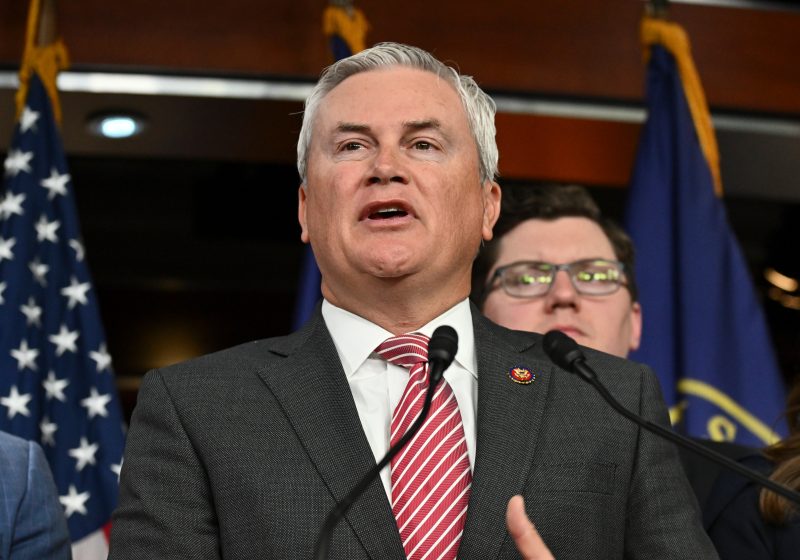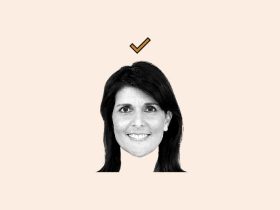“Joe Biden was using a pseudonym and he copied his son about a shady, shady transaction where Joe Biden was going to leverage American tax dollars to save his son’s butt. … Along the same time period, we found a pseudonym where he copied Hunter Biden and it would lead one to believe that this was Joe Biden’s way of copying Hunter Biden to say, okay, send it to the Burisma owners and tell them help is on the way, and five days later, Joe Biden flew to Ukraine to begin the process of firing the prosecutor in exchange for America tax dollars in the form of foreign aid.”
— Rep. James Comer (R-Ky.), in an interview with Newsmax, Aug. 29
Comer, the chair of the House Oversight Committee, is leading the congressional investigation into Hunter Biden’s business dealings when his father was vice president. Last week, in an interview, he pointed to an email in which he claimed that Joe Biden was sending a secret message to his son that he was about to fire a Ukrainian prosecutor — a move that supposedly would have furthered his son’s business interests.
Newsmax flashed an image of the email, sent from an assistant to the vice president to the address of “Robert.L.Peters@pci.gov.” The email listed the vice president’s schedule for the day, including a planned call with the Ukrainian president, who then was Petro Poroshenko. Hunter Biden was copied on the email.
The discovery of this email and Biden’s use of the pseudonym Robert L. Peters led Comer to request from the National Archives and Records Administration all unredacted documents and communications in which Biden used a pseudonym while vice president, as well as any emails in which Hunter Biden or his business associates were copied.
But there’s one big problem with Comer’s claim: The email is dated May 26, 2016. The prosecutor in question had been dismissed by the Ukrainian parliament two months earlier.
As we have noted before, there are two narratives about the dismissal of Viktor Shokin, the former Ukrainian prosecutor general.
The original narrative — documented at the time — was that the European Union, the International Monetary Fund and the United States (along with some Republican senators) believed that Shokin was not acting aggressively to root out corruption, and that Poroshenko needed to remove Shokin to demonstrate he was serious about dealing with a perennial problem in the Ukrainian government. To put pressure on Poroshenko, Biden withheld a promised $1 billion loan guarantee until Shokin was removed.
The alternative narrative, advanced by Republican critics of Biden, is that Shokin was removed at Biden’s behest because he was getting ready to act against the owner of Burisma, a Ukrainian energy firm that had put Hunter Biden on its board. There is little evidence that is the case, as the specific complaint of the international community was that Shokin had failed to act against Burisma. But that has not stopped Republicans like Comer from advancing this alternative narrative, even in the face of new evidence.
For instance, Devon Archer, a fellow Burisma board member, said in a closed-door interview with lawmakers July 31 that he was told at the time of Shokin’s firing that it was a setback for the company, according to a transcript. “That’s what was I told, that it was bad for Burisma,” he said. “But I don’t know. I don’t know if it was good or bad.”
Paradoxically, a key reason for the rise of this alternative narrative was remarks Joe Biden made in 2018 at a Council on Foreign Relations event. He managed to squeeze several months of slow diplomacy into a damaging sound bite: “I looked at them and said, ‘I’m leaving in six hours. If the prosecutor is not fired, you’re not getting the money.’ Well, son of a b—-. He got fired.” The Trump campaign widely circulated the video during the 2020 campaign, and it continues to resonate with Biden critics.
Comer, in his interview, appears to be counting on his listeners to accept the idea that Biden was acting as a shakedown artist on behalf of his son. He said it was “alarming” that Hunter was copied on the email. He asked: “Why was he receiving emails about Ukrainian policy right before they were going to fire that prosecutor?”
It’s a nonsensical question. Here’s a quick timeline of Shokin’s firing. Keep in mind that the email is dated May 26, 2016.
Sept. 24, 2015: U.S. Ambassador Geoffrey Pyatt makes a speech in Ukraine in which he blasts the prosecutor’s office for “openly and aggressively undermining reform” and having “undermined prosecutors working on legitimate corruption cases.”
Dec. 8: Vice President Biden addresses the Ukrainian parliament and decries the “cancer of corruption” in the country. “The Office of the General Prosecutor desperately needs reform,” he says. In a meeting with Poroshenko the day before, Biden had linked granting the loan guarantee to Shokin’s ouster.
Jan. 20, 2016: Biden meets with Poroshenko on the sidelines of the World Economic Forum in Davos, Switzerland. He emphasizes “the need to continue to move forward on Ukraine’s anti-corruption agenda,” according to a White House statement.
Feb. 11: Biden speaks to Poroshenko by phone. “The two leaders agreed on the importance of unity among Ukrainian political forces to quickly pass reforms in line with the commitments in its IMF program, including measures focused on rooting out corruption,” the White House said.
Feb. 16: Poroshenko announces he has asked Shokin to resign. “This morning I have met and had a serious conversation with the prosecutor general. I have suggested Viktor Mykolayovych [Shokin] should write a letter of resignation,” the president said in a statement.
Feb. 18: Another call takes place between Biden and Poroshenko. “The Vice President also commended President Poroshenko’s decision to replace Prosecutor General Shokin, which paves the way for needed reform of the prosecutorial service,” the White House said in a statement.
Feb. 19: Poroshenko announces he has received Shokin’s resignation letter.
March 29: The Ukrainian parliament, in a 289-6 vote, approves Shokin’s dismissal.
May 12: Poroshenko nominates Yuri Lutsenko as the new prosecutor general.
May 13: In a phone call, Biden tells Poroshenko he welcomed Lutsenko’s appointment and the creation of an inspector general in the prosecutor’s office. “The Vice President informed President Poroshenko that the United States was prepared to move forward with the signing of the third $1 billion loan guarantee agreement, which will support continued progress on Ukrainian reforms,” a White House statement said. (The loan guarantee was signed on June 3, with Pyatt representing the United States.)
So, all of this took place before the email that so concerns Comer. The email mentions “8:45 a.m. prep” for a 9 a.m. call with Poroshenko. The White House statement on the call shows Shokin was no longer a subject of discussion.
“The Vice President congratulated President Poroshenko on the release of Ukrainian pilot and Rada member Nadiya Savchenko and called for the release of all Ukrainians unlawfully detained in Russia,” the statement said. “The leaders discussed the importance of continuing to institute reforms in the Office of the Prosecutor General, and the significance of Ukraine’s progress toward implementing judicial reforms and meeting IMF conditions. The leaders condemned the increasing attacks by combined Russian-separatist forces in eastern Ukraine and reaffirmed the need to continue moving forward on Minsk implementation. They also condemned Russia’s persecution of Crimean Tatars.”
So why would Hunter Biden be copied on this particular email concerning his father’s schedule? One clue: the schedule notes that the vice president would remain overnight at “Lake House,” a Biden property in Delaware. Local Delaware media reported that the Biden family gathered that Memorial Day weekend on the first anniversary of the death of Beau Biden, Biden’s other son, when Delaware’s National Guard headquarters was dedicated to him.
A representative for Hunter Biden’s legal team said that Joe Biden copied his son on the email to let his son know that he was getting back to Delaware because he wanted him there for the anniversary weekend of Beau’s passing.
As for the use of a pseudonym, it’s no surprise Biden would have had one, as it was disclosed during the Obama presidency that senior officials had such accounts. After the Associated Press reported in 2013 that many top officials had secret email accounts, White House spokesman Jay Carney said these were secondary government accounts, subject to the Freedom of Information Act, to avoid having inboxes flooded with messages.
“Having alternate email addresses for cabinet secretaries and other high-profile officials makes eminent sense,” Carney said. “If they are inundated in one account with either public emails, or spam or the like, then they can continue to use their other account for normal work.”
Indeed, a listing of federal domain names on GitHub shows that “pci.gov,” which is how the Robert L. Peters email ends, is associated with the Executive Office of the President, which includes the vice president’s office. NARA, in response to a FOIA request filed in 2022 by the Southeastern Legal Foundation, has said it found 5,138 emails and 225 other records that reference three pseudonyms used by President Biden, including the Robert L. Peters address. Two email addresses are associated with Gmail accounts. The emails have not yet been released.
We repeatedly sought comment from Comer’s communications staff but did not receive a response.
Comer has a tendency to mess up details or lose nuance when he shows up on television, but he really shoots himself in the foot here. He claims that Biden was sending a secret message to his son about how he was going to tell the Ukrainian president to fire the prosecutor — but the email was sent two months after the firing. Skeptics may doubt whether Hunter Biden was copied on the email for family matters, but it’s certainly not because of the nefarious purpose suggested by Comer.
Comer earns Four Pinocchios.
(About our rating scale)
Send us facts to check by filling out this form
Sign up for The Fact Checker weekly newsletter
The Fact Checker is a verified signatory to the International Fact-Checking Network code of principles








